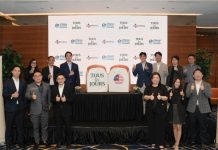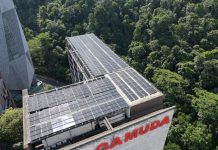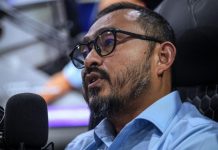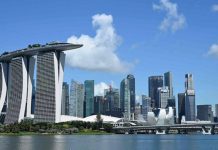- World Startup Festival to kick start funding programme in Malaysia
- PUNB inks MoU with UNITAR to increase Bumiputera student entrepreneurship
- Equity market to continue uptrend in 2018, says Pacific Mutual
- China slaps retaliatory tariffs on 128 US imports
- Trump to unveil China tariff list this week, targeting tech goods
- Rehab device takes fast track at 2018 Games
- MAS and financial industry to develop guidance on responsible use of data analytics
- Enterprise Singapore formed to grow stronger companies
World Startup Festival to kick start funding programme in Malaysia
US-based World Startup Festival (WSF), a global entrepreneurship platform, plans to kick off its first accelerator funding programme in Malaysia this early April. Its President, Freda Miriklis said thr programme would be conducted on a monthly basis and was a prerequisite for startups who were seeking funding through WSF’s network of private equity investors. WSF, a super connector for businesses worldwide and a complete business incubator, has an fund size of US$20 million and offered accelerator programmes, international media exposure, pre-seed to initial public offering investments, international market access, networking festivals, startup ratings and awards. “Startups who participate in all three requisite modules of the accelerator programme and show satisfactory progress in their businesses, will be guaranteed funding in the next stage,” Miriklis told Bernama.
PUNB inks MoU with UNITAR to increase Bumiputera student entrepreneurship
Perbadanan Usahawan Nasional Bhd (PUNB) has inked a Memorandum of Understanding (MoU) with UNITAR International University to increase the participation of Bumiputera students in entrepreneurship. Chief Executive Officer, Datuk Azhar Ahmad said the programme would be utilising funds under the Budding Prosper Usahawan Muda (PUMA), with PUNB having allocated RM1 million since October, 2017. “We are aiming to assist about 100 students via this fund. But, after roadshows in public, as well as at private universities, we have to date only received about 20 applications for the fund.
Equity market to continue uptrend in 2018, says Pacific Mutual
The equity market will continue to be on an uptrend in 2018 despite greater market volatility, said Pacific Mutual Fund Bhd. Chief Executive Officer and Executive Director, Teh Chi-cheun said policies and political issues that could cause markets to be volatile include, rising trade tensions, although the company’s base case assumption was no full-blown trade war. Other factors include the impact of interest rate hikes in the United States, a tapering in the Eurozone, changes in the US administration, Brexit negotiations and geo-political risks, be it the Middle East, Russia or North Korea. “Locally, the impending general elections might cause a slowdown in activities as investors and businesses await the dissolution of Parliament and the various political posturing and campaigning. “That said, for the local bourse, there are pockets of opportunities in this environment,” said Teh in a statement.
China slaps retaliatory tariffs on 128 US imports, US to announced China tariff list this week
China today imposed tariffs on 128 US imports worth US$3 billion, including fruits and pork, retaliating for US duties on steel and aluminium. Xinhua news agency said China’s move was decided by the custom tariffs commission of the State Council. The Trump administration had said its duties were aimed at steel and aluminium imports that it deemed a threat to US national security, but China’s Commerce Ministry on Monday called that reasoning an “abuse” of World Trade Organization (WTO) guidelines. US President Donald Trump has repeatedly railed against China’s massive trade surplus with the United States and promised during the US election campaign to take steps to slash the US deficit. Beijing had warned last month that it was considering the tariffs of 15 per cent and 25 per cent on a range of products that also include wine, nuts and aluminium scrap. Xinhua said the move came into force on Monday.
Meanwhile President Trump is expected to unveil China tariff list this week. Administration officials said the list of US$50 billion to US$60 billion worth of annual imports is expected to target “largely high-technology” products and it may be more than two months before tariffs take effect. The U.S. Trade Representative’s office needs to unveil the list of products by Friday under President Donald Trump’s China tariff proclamation signed on 22 March. The tariffs are aimed at forcing changes to Chinese government policies that USTR says results in the “uneconomic” transfer of U.S. intellectual property to Chinese companies. U.S. technology industry officials said they expected the Trump administration’s list to target products that benefit from Beijing’s “Made in China 2025” program, which aims to upgrade the country’s domestic manufacturing base with more advanced products. The state-led program targets 10 strategic industries for replacing imports with Chinese-made products: advanced information technology, robotics, aircraft, shipbuilding and marine engineering, advanced rail equipment, new energy vehicles, electrical generation equipment, agricultural machinery, pharmaceuticals and advanced materials. “Foreign technology acquisition through various means remains a prime focus under Made in China 2025 because China is still catching up in many of the areas prioritized for development,” USTR said in its report justifying the tariffs. U.S. Trade Representative Robert Lighthizer has said that preserving America’s technological edge is “the future of the U.S. economy.” Reports that the tariff list may also include consumer goods such as clothing and footwear drew strong protests from U.S. business groups, which argued that it would raise prices for U.S. consumers.

Rehab device takes fast track at 2018 Games
South Australian sport-tech startup Prohab will launch its new rehabilitation device at the Gold Coast 2018 Commonwealth Games. The Prohab rehab device connects to standard resistance bands or cables, widely used in physiotherapy, to precisely measure the force applied to the band. The data is then captured and sent to an app where it can be visualised instantaneously as well as tracked over time. This helps the patient and their medical professionals to make more accurate, tailored treatment programs for sporting injuries and fitness training. The device can be used for training athletes and sportspeople as well as to motivate and monitor patients recovering from injury or surgery. The Gold Coast 2018 Commonwealth Games from 4-15 April will welcome more than 6,600 athletes and team officials from 71 Commonwealth nations and territories to the Gold Coast and event cities Brisbane, Cairns and Townsville. More than $4.5 billion is invested in sporting technology (‘sportstech’) globally, on developments such as smart stadiums, wearable devices and other ways to support the health and safety of players and fans.
MAS and financial industry to develop guidance on responsible use of data analytics
The Monetary Authority of Singapore (MAS) is working with key industry stakeholders to develop a guide to promote the responsible and ethical use of artificial intelligence (AI) and data analytics by financial institutions. The guide will set out key principles and best practices for the use of AI and data analytics, helping financial institutions to strengthen internal governance and reduce risks of data misuse. The guide is targeted for completion by the end of the year. It will cover all segments of the financial sector including FinTech firms. MAS has brought together a group of thought leaders and practitioners in data analytics in the financial sector to co-create the guide
Enterprise Singapore formed to grow stronger companies
Enterprise Singapore was officially launched today through the merger of International Enterprise (IE) Singapore and SPRING Singapore. Enterprise Singapore will be the single agency championing the growth of Singapore companies of all sizes. It will also continue to establish Singapore as a leading global trading hub, and build trust in Singapore’s products and services. Enterprise Singapore is structured to help companies of all sizes – from startups, micro and small companies, to mid-sized and large companies – grow stronger and stay globally competitive. Based on their stage of growth, the industry in which they operate, and their overseas markets of interest, Enterprise Singapore will work with companies to enhance productivity, innovate, go digital, develop talent and internationalise. Enterprise Singapore will enhance its global networks to support companies going overseas. This includes working with them to capture new opportunities in emerging markets and sourcing for technology solutions and partners in developed markets. Streamlining assistance to be more effective.
























